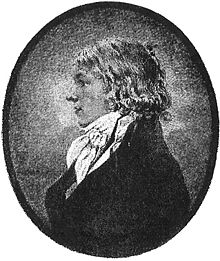This article includes a list of references, related reading, or external links, but its sources remain unclear because it lacks inline citations. (September 2023) |
Felix Ivo Leicher (18 or 19 May 1727 – 20 February 1812) was a Czech-Austrian painter of altarpieces and secular works, which was spread to a wide area throughout the Habsburg Empire and beyond.

Early life
editHe was born in the Silesian town Bílovec, today on the wall to the right of the main entrance of the parish church is a plaque that hangs in his memory. He was apprenticed to a weaver, and later studied cutlery at school. But his break came in a local painter shop with Francis Andrew Schaffer, where he learned the basics of painting. Painting excited him and it became his entire life. From 1751 he studied at the Academy of Fine Arts Vienna, and in 1754 in a competition he received the second prize for painting Anointing Saul the King (today, this image is a preparatory sketch in the German National Museum in Nuremberg), which had secured the support of the future of this school.
Career
editHis teacher there was, Franz Anton Maulbertsch, with whom he worked throughout his life kept friendly relations, working together as the frescoes and paintings for a church in Mikulov. In many places, Leicher painted altarpieces in churches with frescoes. A typical example of that is the altarpiece of the Holy Trinity Church in Fulnek, that he painted around 1760. The influence of his teachers could be seen in his work, as is evident in the rich coloristic main altar painting in Bílovec. In several cases, the works were long attributed to just Maulbertsch and only recently found their true authorship as Leicher's.
There is now no doubt that many of his works are still hidden in anonymity in various churches and collections, sometimes surprisingly authorship is revealed even smaller genre paintings and numerous sketches and drawings bear the marks of his hands. In the latter part of the 18th century he devoted himself also to creating smaller cabinet paintings with secular themes.
Style
editHis composition, the concept of shapes, light handling and other features paintings show a significant effect of the work Maulbertsch, whose work he admired. His approach is quieter, the expression of the character rather lyrical, restrained, narrative tuned. Unlike Maulbertsch, Leicher was not affected by the expressive manifestation of Paul Troger. He was inspired apparently also by other Venetian painters of 18th century, particularly the compositions of Giambattista Pittoni, and also images of Peter Paul Rubens. It is most evident on two paintings for the church altar of John the Baptist in Kroměříž. Its development lacks obvious drama or a representative sample of altarpieces in Opava parish church of the Assumption, which are often seen as the most perfect, do not lose connection to the Rococo works of his early creative period.
Some critics, however, see more inspiration coming from the works of Michelangelo Unterberger, a professor at the Vienna Academy, whose work was a kind of moderate variant of the former academic uniform style, especially for it suggests a simple, clear compositional solutions and more lyrical, moderate tone of works by both artists.
References
edit- Horová, Angel. New Encyclopaedia of Czech art. Prague: Academia, 1995. 546 pages. ISBN 80-200-0521-8.
- Jelonek, Emil. Felix Ivo Leicher. In Das Kuhländchen. 7th volume. Neu-Titschein: L. V. Enders'sch, to 1926. 200 pages. Pages 17–20, 33–37, 49–52.
- Kršek, Ivo. History of Czech Fine Arts, Part II / 2nd
- Kršek, Ivo. Baroque art in Moravia and Silesia. Academia, 1996.
- Kuchta, Zdeněk. Notable natives and personality Bílovecká. Bílovec: City Bílovec, 2009. ISBN 978-80-254-6373-4. Section Leicher Felix Ivo, pages 54–55.
- A. Petrova-Pleskotová to the work of Felix Ivo Leicher the Slovak Republic. In ARS, Issue 1, 1985.
- Schenk, Marie; Olšovský, Jaromír. Baroque painting and sculpture in the western part of Czech Silesia. Opava: Silesian Museum, Francis Maj, 2001. 274 pp. ISBN 80-86458-06-7.
- Schenk, Marie; Olšovský, Jaromír. Baroque painting and sculpture in the eastern part of the Czech Silesia.
- Opava: Silesian Museum, Francis Maj, 2004. 265 pp. ISBN 80-86224-46-5.
- Nightingale, Lubomir. Felix Ivo Leicher. Dissertation FF UJEP Brno 1972.
- SLAVÍČEK, Lubomir. Felix Ivo Leicher, ein Maler ohne Eigenschaften? Versuch einer Stildefinition seines Oeuvres. In Edward Hindelang, Lubomir Nightingale. Franz Anton Maulbertsch und Mitteleuropa: Beiträge zum 30 jährigen Bestehen des Museums Langenargen. Langenargen - Brno: Masaryk University, 2007. ISBN 978-80-210-4394-7. p 221–243. (German)
- Nightingale, Lubomir. Contributions to the knowledge of Felix Ivo Leicher in northern Moravia. In Proceedings of conservation in the North Region. Number 5, 1982.
- Toman, Prokop. New Dictionary of Czechoslovak artists. 3rd 2nd ed Volume Prague: Rudolf Rysavy: Shape 1950s. Password Leicher, Felix Ivo, p 19 to 20
- Vollmer, Hans. Allgemeines Lexikon der Kunst bildenden. 22nd volume. Leipzig, 1928